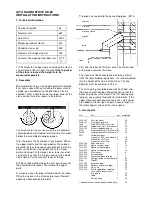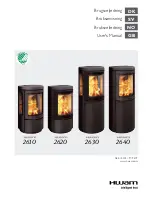
4. Safety distances to combustible materials
Front
1000 mm
Sides
500 mm
1)
Back
500 mm
1)
Upwards
1200 mm
2)
1) The safety distances can be reduced by 50 % when
using single light shielding and 75 % when using
double light shielding.
2) The safety distances can be reduced by 25 % when
using single light shielding and 50 % when using
double light shielding.
Single light shielding can be provided by a non-
combustible fiber-reinforced cement plate at least 7
mm thick, or a sheet metal plate at least 1 mm thick
and attached with a sufficient number of fastenings.
Double shielding can be provided from two of the
above plates.
The sheets should be attached to the back, and if
necessary to each other, with screws for example. A
space of at least 30 mm for ventilation must be left
between the surface that needs protecting and the
plate with pipe sleeves, for example, used as spacers.
Also the shielding must not extend to the floor or
ceiling.
Brickwork 55 mm thick, detached at the edges and at
a distance of at least 30 mm from the surface to be
protected is equivalent to single light shielding.
Similarly brickwork 110 mm thick and at a distance of
30 mm from the surface to be protected is equivalent
to double light shielding.
The stove should be placed on a non-flammable
immovable stand.
REGULATIONS OF THE LOCAL FIRE
AUTHORITIES MUST BE OBSERVED IN ADDITION
TO THE ABOVE INSTRUCTIONS.
5. Heating instructions
Wood, peat briquettes and paper can be used as fuel.
Chipboard, fiberboard and plastics are not allowed.
The fuel should be stored so that the temperature of
the fuel does not exceed 80 degrees C.
Open the smoke
damper and draw the
ash box open for 5-
10 cm. See that
sufficiently
combustion air
comes into the sauna
either from the valve
or through the door.
Note that the sauna
is not ready for
bathing until the
heating has been stopped and the löyly shutter is
opened.
Empty the ash box
and see that sufficient space for
combustion air is left between the ashes and the fire
grate and space for circulation air during bathing.
The fire chamber is filled with firewood (preferably
small, dry birch wood) and set afire in the middle of
the pile. During burning the fire chamber door is kept
shut and the ash box open. When more than half of
the wood has been burned, the fire compartment is
refilled sufficiently often. Towards the end of heating
the draught can be lessened by the help of the ash
box.
Heating is stopped, when the lower parts of the
upper stones are red.
For the last fill it is
advantageous to use small firewood, which burn up
quickly and do not leave much embers. Note that a
heat storage stove shall always be heated red hot to
prevent soot problems.
When there are almost no embers left, the ashes from
the grate are clattered to the ash box and the ash box,
fire chamber door and smoke damper are closed.
After this the redness spreads to the upper surfaces of
the stones and the stones become sootless. The first
löyly (to get the fumes out) is thrown with the smoke
damper open to remove the dust from the stones.
After this the sauna is ventilated.
The required löyly temperature is reached and
adjusted by opening the löyly shutter somewhat or by
removing it. The hot air circulation can be
strengthened also by drawing the ash box slightly
open.
If there is no ventilation
valve in the upper part
of the sauna, the sauna
can when necessary
be ventilated by closing
the löyly shutter and by
opening the flap in front
of the smoke damper.
This can also be used
for drying the sauna
after bathing. The
smoke damper must
then be shut (picture).
The Aito stove can also be used as a smoke sauna
stove. Towards the end of heating the stove is then
heated with the smoke damper closed and the löyly
shutter open.
The sauna stones should be checked from time to
time and replaced if crumbled. AK-68 has the
following amounts of peridotite stones:
60 kg
size 5-10 cm
150 kg
size 10-15 cm
40 kg
size over 15 cm





















